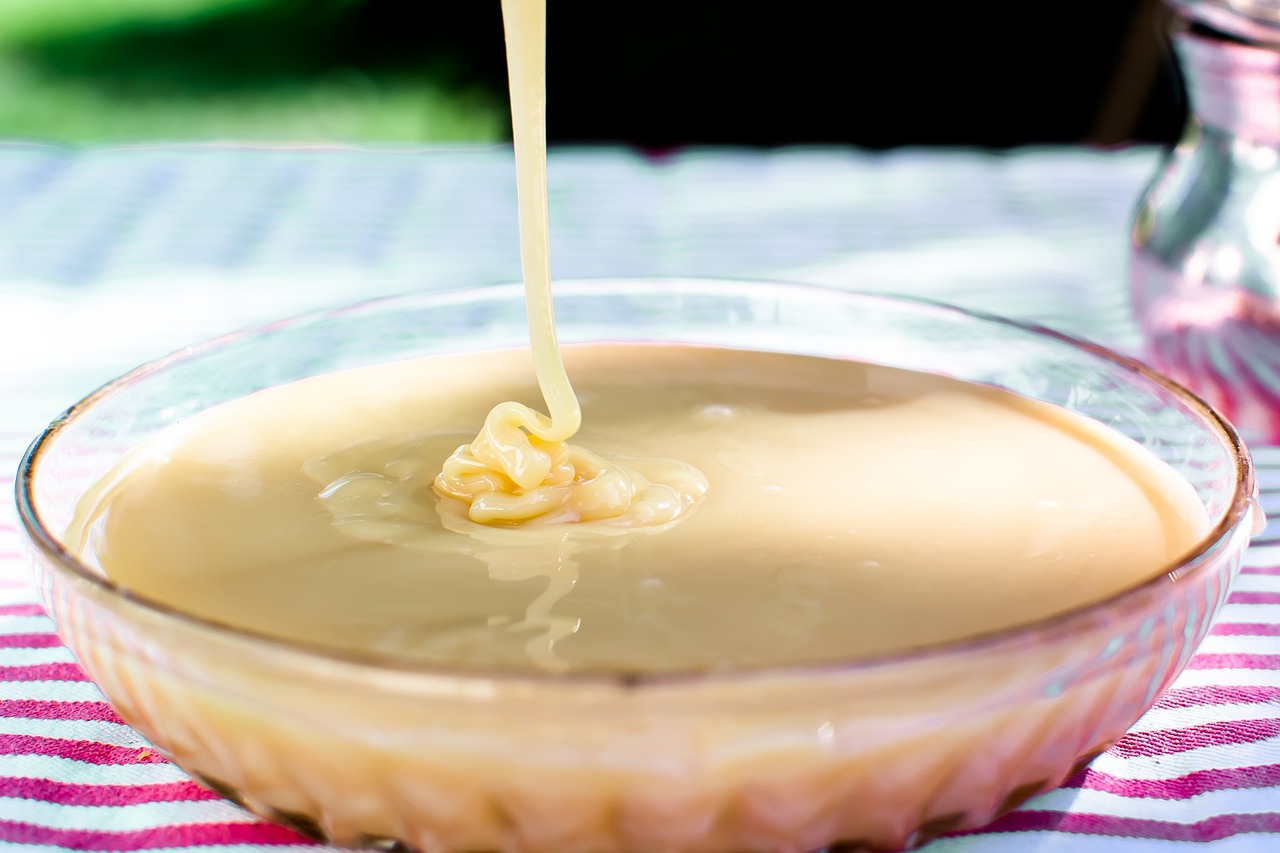Some of the links on this page are affiliate links, which means that Buzzy Kitchen earns commission from purchases made – at absolutely no extra cost to you. Thank you so much for supporting Buzzy Kitchen!
Because of its versatility, I always have a tin of condensed milk in the back of my kitchen cupboards somewhere. Not only does it make some tasty and indulgent desserts, it can also be used in savoury dishes, in hot drinks, and as a side to crumbles and similar desserts. But can you freeze condensed milk to extend its life? And what happens when you do?
Why don’t we take a closer look and find out?
Can You Freeze Condensed Milk?
No, you shouldn’t freeze condensed milk.
It’s not advisable, anyway. (Some foodies and chefs disagree.)
The high sugar content of the dairy product creates problems for the freezing process, so it’ll turn into slush more than an actual solid lump. It’s used in countless ice cream recipes for that very reason.
If you do sludge-freeze condensed milk, you will find that the texture and appearance of the product changes. Quality degrades with the freezing process, and you might find it becomes watery or creamier, and also a bit gritty.
How Long Does Condensed Milk Last Unopened?
Unopened, condensed milk will last for up to 2 years.
One of the biggest selling points behind condensed milk is just how long it can last. It was created to solve the problem of transporting and storing milk during the Civil War, and then subsequent wars. Fresh milk turned bad very quickly, so an easy, affordable, long-lasting substitute was needed. That’s when condensed milk first became a big household item.
You’ll get the maximum storage time by keeping the milk in a dark, cool, moisture-free place, such as a pantry or kitchen cupboard.
Just make sure it’s not directly above or next to an oven. Heat will alter the product.
How Long Does Condensed Milk Last in the Fridge?
Condensed milk lasts for up to 7 days in the fridge, in an airtight container.
It should be treated the same way as any milk product once it has been opened. This means fully covering it, such as with a silicone tin cover; and making sure it is consumed before it turns bad, which is in about seven to ten days.
Carnation (Nestle) suggests using condensed milk within three days of opening it and storing it in the fridge.
Can You Eat Out-of-Date Condensed Milk?
Yes, in some cases, you can eat, use, or cook with out-of-date condensed milk.
Because of the high sugar content, condensed milk can be preserved for a really long time. Although the manufacturers state that it must be eaten within around two years, the product itself won’t turn bad right there and then.
I have personally cooked with a can of condensed milk that was almost a year out of date, with no health problems, but this is very much a judgement call.
Check the milk if you’re not sure. Give it a sniff once you’ve opened it, and check that the texture, smell, and appearance is as it should be. If it’s mouldy, smells funky, starts separating, or otherwise looks unpleasant, don’t eat or cook with it and throw it away.
Does Condensed Milk Need to Be Refrigerated?
Yes, condensed milk, once opened, does need to be refrigerated.
You could use the remainder of the tin in a wide variety of ways, however. You can make fudge, cookies, brownies, cheesecakes, ice creams, desserts, and more with condensed milk. You can also use it to upgrade your regular cup of coffee. It’ll make it sweeter, creamier, and (in my opinion) super delicious.

What Happens to Condensed Milk When It Goes Bad?
Bacteria thrives on high-sugar foods left at room temperature, and condensed milk is most definitely a high-sugar food.
In the same way as you see with jam, condensed milk will likely start to develop mould when it turns bad. You may also notice separation and a change in colour, and the smell will be different. The longer the milk is left, the sourer it will smell.
You must remember that this product is made with cow’s milk. Despite the high-sugar content, the milk content will curdle and turn sour.
What’s the Best Way to Store Open Condensed Milk?
Open condensed milk is best kept in the fridge, in an airtight container.
If you pop the can back in the fridge, without a cover, the milk still comes into contact with air, albeit cold air. Because of this, it will start to turn bad quicker than if you were to have transferred it to an airtight container before refrigeration. Uncovered food will also absorb strong flavours from inside the fridge, such as onion and garlic.
You could always use a food can cover. These are pretty cheap on Amazon, and they’re great for when you don’t want to make a whole new Tupperware tub dirty.
I don’t personally like keeping the condensed milk in the tin, in the fridge. Maybe it’s just me, but I’m sure the metallic flavour from the can bleeds into the milk after a while.
How to Store Unopened Condensed Milk
An unopen tin of condensed milk will last longer and keep its quality when it is stored in a cool, dark place. This could be your kitchen cupboard or pantry, but it shouldn’t be next to or above the oven. It’s also not recommended to store food products in cupboards next to the fridge because of the warmth the appliance can emit.
You do not need to keep an unopened tin of condensed milk in the fridge.
How Long Can Condensed Milk Stay at Room Temperature?
Once opened, you should refrigerate condensed milk within two hours.
As soon as you open the tin, yeast and bacteria start growing. These won’t reach harmful levels for a while (around two hours), but eventually will cause the condensed milk to start separating and turning sour.
Will Condensed Milk Set in the Fridge?
No, condensed milk will not set in the fridge.
The texture will get firmer, however. It can be quite difficult to pour chilled condensed milk, so I’d personally recommend getting it out of the fridge 20 minutes or so before you plan to use it.
Tins of condensed milk that have been left, untouched and unmoved, for a long period of time can settle slightly. For this reason, it’s a good idea to give the can a good shake before you attempt to open it.
I hope I’ve answered your condensed milk questions today, but as always, I’d love to hear from you if you have more. You can ask us a question anonymously, or you can use the Contact Us page.
If you’re looking for inspiration when it comes to using up that leftover condensed milk, or the old tin in the back of the cupboard, I recommend checking out the following:
